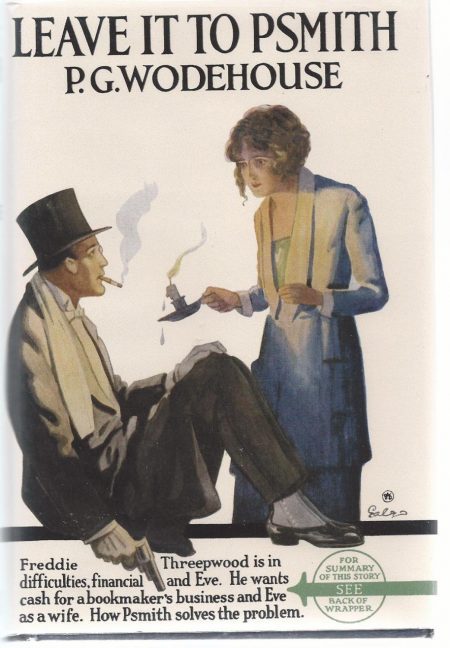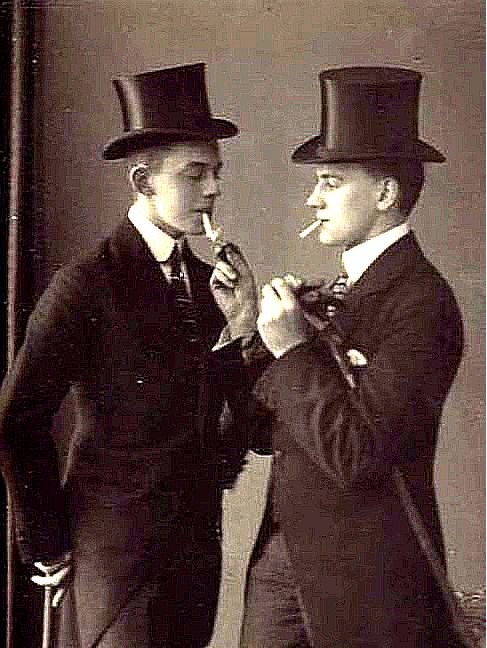LEAVE IT TO PSMITH (15)
By:
April 16, 2019

Leave It to Psmith (1923) is the last and most rewarding of four novels featuring the dandy, wit, and would-be adventurer Ronald Eustace Psmith, one of P.G. Wodehouse‘s most popular characters. (“One can date exactly,” Evelyn Waugh claimed, in reference to Psmith’s debut in the 1909 novel Mike, “the first moment when Wodehouse was touched by the sacred flame.”) Leave It to Psmith‘s copyright enters the public domain in 2019; HiLoBooks is pleased to serialize this terrific book here at HILOBROW. Enjoy!

‘I say, old thing,’ said Freddie plaintively, ‘you couldn’t talk a bit less, could you? I’ve only got about two minutes.’
‘I beg your pardon. Proceed.’
‘It’s so dashed difficult to know how to begin the thing. I mean, it’s all a bit complicated till you get the hang of it. … Look here, you said in your advertisement that you had no objection to crime.’
Psmith considered the point.
‘Within reason — and if undetected — I see no objection to two penn’orth of crime.’
‘Well, look here… look here… Well, look here,’ said Freddie, ‘will you steal my aunt’s diamond necklace?’
Psmith placed his monocle in his eye and bent gravely toward his companion.
‘Steal your aunt’s necklace?’ he said indulgently.
‘Yes.’
‘You do not think she might consider it a liberty from one to whom she has never been introduced?’
What Freddie might have replied to this pertinent question will never be known, for at this moment, looking nervously at his watch for the twentieth time, he observed that the hands had passed the half-hour and were well on their way to twenty-five minutes to one. He bounded up with a cry.
‘I must go! I shall miss that damned train!’
‘And meanwhile… ?’ said Psmith.
The familiar phrase — the words ‘And meanwhile’ had occurred at least once in every film Freddie had ever seen — had the effect of wrenching the latter’s mind back to the subject in hand for a moment. Freddie was not a clear-thinking young
man, but even he could see that he had left the negotiations suspended at a very unsatisfactory point. Nevertheless, he had to catch that twelve-fifty.
‘Write and tell me what you think about it,’ panted Freddie, skimming through the lobby like a swallow.
‘You have unfortunately omitted to leave a name and address,’ Psmith pointed out, following him at an easy jog-trot.
In spite of his hurry, a prudence born of much movie-seeing restrained Freddie from supplying the information asked for. Give away your name and address and you never knew what might happen.
‘I’ll write to you,’ he cried, racing for a cab.
‘I shall count the minutes,’ said Psmith courteously.
‘Drive like blazes,’ said Freddie to the chauffeur.
‘Where?’ inquired the man, not unreasonably.
‘Eh? Oh, Paddington.’
The cab whirled off, and Psmith, pleasantly conscious of a morning not ill-spent, gazed after it pensively for a moment. Then, with the feeling that the authorities of Colney Hatch or some kindred establishment had been extraordinarily negligent, he permitted his mind to turn with genial anticipation in the direction of lunch. For, though he had celebrated his first day of emancipation from Billingsgate Fish Market by rising late and breakfasting later, he had become aware by now of that not unpleasant emptiness which is the silent luncheon-gong of the soul.
The minor problem now presented itself of where to lunch; and with scarcely a moment’s consideration he dismissed those large, noisy, and bustling restaurants which lie near Piccadilly Circus. After a morning spent with Eve Halliday and the young man who was going about the place asking people to steal his aunt’s necklace, it was imperative that he select some place where he could sit and think quietly. Any food of which he partook must be consumed in calm, even cloistral surroundings, unpolluted by the presence of a first violin who tied himself into knots and an orchestra in whose lexicon there was no such word as piano. One of his clubs seemed indicated.
In the days of his prosperity, Psmith’s father, an enthusiastic clubman, had enrolled his son’s name on the list of several institutions: and now, although the lean years had arrived, he was still a member of six, and would continue to be a member till the beginning of the new year and the consequent call for fresh subscriptions. These clubs ranged from the Drones, frankly frivolous, to the Senior Conservative, solidly worthy.
Almost immediately Psmith decided that for such a mood as was upon him at the moment, the latter might have been specially constructed.
Anybody familiar with the interior of the Senior Conservative Club would have applauded his choice. In the whole of London no better haven could have been found by one desirous of staying his interior with excellently cooked food while passing his soul under a leisurely examination. They fed you well at the Drones, too, no doubt; but there Youth held carnival, and the thoughtful man, examining his soul, was apt at any moment to have his meditations broken in upon by a chunk of bread, dexterously thrown by some bright spirit at an adjoining table. No horror of that description could possibly occur at the Senior Conservative. The Senior Conservative has six thousand one hundred and eleven members. Some of the six thousand one hundred and eleven are more respectable than the others, but they are all respectable — whether they be numbered among the oldest inhabitants like the Earl of Emsworth, who joined as a country member in 1888, or are among the recent creations of the last election of candidates. They are bald, reverend men, who look as if they arc on their way to the City to preside at directors’ meetings or have dropped in after conferring with the Prime Minister at Downing Street as to the prospects at the coming by-election in the Little Wabsley Division.
With the quiet dignity which atoned for his lack in years in this stronghold of mellow worth, Psmith mounted the steps, passed through the doors which were obligingly flung open for him by two uniformed dignitaries, and made his way to the coffee-room, where, having selected a table in the middle of the room and ordered a simple and appetizing lunch, he gave himself up to thoughts of Eve Halliday. As he had confessed to his young friend Mr. Walderwick, she had made a powerful impression upon him. He was tearing himself from his day-dreams in order to wrestle with a mutton chop, when a foreign body shot into his orbit and blundered heavily against the table. Looking up, he perceived a long, thin, elderly gentleman of pleasantly vague aspect, who immediately began to apologize.
‘My dear sir, I am extremely sorry. I trust I have caused no damage.’
‘None whatever,’ replied Psmith courteously.
‘The fact is, I have mislaid my glasses. Blind as a bat without them. Can’t see where I’m going.’
A gloomy-looking young man with long and disordered hair, who stood at the elderly gentleman’s elbow, coughed suggestively. He was shuffling restlessly, and appeared to be anxious to close the episode and move on. A young man, evidently, of highly-strung temperament, he had a sullen air.
The elderly gentleman started vaguely at the sound of the cough.
‘Eh,’ he said, as if in answer to some spoken remark. ‘Oh, yes, quite so, quite so, mv dear fellow. Mustn’t stop here chatting, eh? Had to apologize, though. Nearly upset this gentleman’s table. Can’t see where I’m going without my glasses. Blind as a bat. Eh what? Quite so, quite so.’
He ambled off, doddering cheerfully, while his companion still preserved his look of sulky aloofness. Psmith gazed at them with interest.
‘Can you tell me,’ he asked of the waiter, who was rallying round with the potatoes, ‘who that was?’
The waiter followed his glance.
‘Don’t know who the young gentleman is, sir. Guest here, I fancy. The old gentleman is the Earl of Emsworth. Lives in the country and doesn’t often come to the club. Very absent-minded gentleman, they tell me. Potatoes, sir?’
‘Thank you,’ said Psmith.
The waiter drifted away, and returned.
‘I have been looking at the guest-book, sir. The name of the gentleman lunching with Lord Emsworth is Mr Ralston McTodd.’
‘Thank you very much. I am sorry you had the trouble.’
‘No trouble, sir.’
Psmith resumed his meal.
SERIALIZED BY HILOBOOKS: Jack London’s The Scarlet Plague | Rudyard Kipling’s With the Night Mail (and “As Easy as A.B.C.”) | Arthur Conan Doyle’s The Poison Belt | H. Rider Haggard’s When the World Shook | Edward Shanks’ The People of the Ruins | William Hope Hodgson’s The Night Land | J.D. Beresford’s Goslings | E.V. Odle’s The Clockwork Man | Cicely Hamilton’s Theodore Savage | Muriel Jaeger’s The Man With Six Senses | Jack London’s “The Red One” | Philip Francis Nowlan’s Armageddon 2419 A.D. | Homer Eon Flint’s The Devolutionist | W.E.B. DuBois’s “The Comet” | Edgar Rice Burroughs’s The Moon Men | Charlotte Perkins Gilman’s Herland | Sax Rohmer’s “The Zayat Kiss” | Eimar O’Duffy’s King Goshawk and the Birds | Frances Hodgson Burnett’s The Lost Prince | Morley Roberts’s The Fugitives | Helen MacInnes’s The Unconquerable | Geoffrey Household’s Watcher in the Shadows | William Haggard’s The High Wire | Hammond Innes’s Air Bridge | James Branch Cabell’s Jurgen | John Buchan’s “No Man’s Land” | John Russell’s “The Fourth Man” | E.M. Forster’s “The Machine Stops” | John Buchan’s Huntingtower | Arthur Conan Doyle’s When the World Screamed | Victor Bridges’ A Rogue By Compulsion | Jack London’s The Iron Heel | H. De Vere Stacpoole’s The Man Who Lost Himself | P.G. Wodehouse’s Leave It to Psmith | Richard Connell’s “The Most Dangerous Game” | Houdini and Lovecraft’s “Imprisoned with the Pharaohs” | Arthur Conan Doyle’s “The Sussex Vampire”.
RADIUM AGE SCIENCE FICTION: “Radium Age” is HILOBROW’s name for the 1904–33 era, which saw the discovery of radioactivity, the revelation that matter itself is constantly in movement — a fitting metaphor for the first decades of the 20th century, during which old scientific, religious, political, and social certainties were shattered. This era also saw the publication of genre-shattering writing by Edgar Rice Burroughs, Sax Rohmer, E.E. “Doc” Smith, Jack London, Arthur Conan Doyle, Aldous Huxley, Olaf Stapledon, Karel Čapek, H.P. Lovecraft, Charlotte Perkins Gilman, Yevgeny Zamyatin, Philip Gordon Wylie, and other pioneers of post-Verne/Wells, pre-Golden Age “science fiction.” More info here.
READ GORGEOUS PAPERBACKS: HiLoBooks has reissued the following 10 obscure but amazing Radium Age science fiction novels in beautiful print editions: Jack London’s The Scarlet Plague, Rudyard Kipling’s With the Night Mail (and “As Easy as A.B.C.”), Arthur Conan Doyle’s The Poison Belt, H. Rider Haggard’s When the World Shook, Edward Shanks’ The People of the Ruins, William Hope Hodgson’s The Night Land, J.D. Beresford’s Goslings, E.V. Odle’s The Clockwork Man, Cicely Hamilton’s Theodore Savage, and Muriel Jaeger’s The Man with Six Senses. For more information, visit the HiLoBooks homepage.
